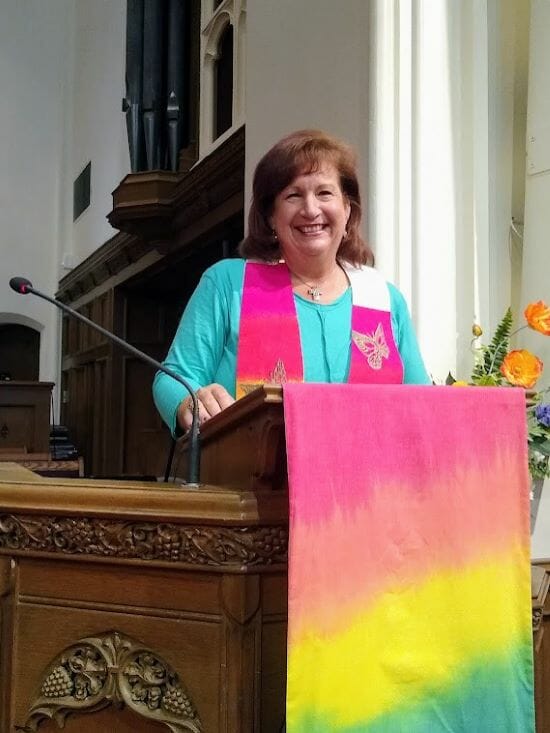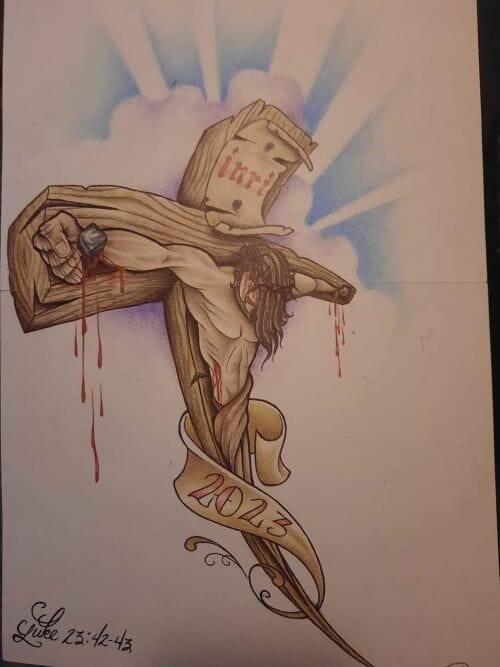Witnessing the State-Sanctioned Killing of Michael Tisius 'It's Quite Horrifying — As It's Intended to Be'
Published July 30th, 2023 at 6:00 AM
Above image credit: Michael Tisius shows his tattoos during an interview at Potosi Correctional Center, Missouri's maximum security prison where condemned men live in the general prison population in Mineral Point, Missouri, on Jan. 11, 2007. Tisius was executed in June. (AP Photo | Jeff Roberson, File)Just before the state of Missouri (on behalf of all of us who are its citizens) executed convicted murderer Michael Tisius in early June, a nurse, following protocol, asked to check his vital signs.
The death row inmate’s spiritual advisor, the Rev. Melissa Potts Bowers — who at that moment was talking with Tisius about his life and the afterlife — thought that was bizarre.
“It’s ironic, really, the attention that’s given to someone that we’re murdering in a few hours. But we want to be sure that his heart rate is OK?” Bowers recalled.
And that’s far from the only thing Bowers found abhorrent about her experience of sitting next to a man in the death chamber at his execution.
“It’s quite horrifying — as it’s intended to be,” Bowers, a Kansas City Hospice & Palliative Care chaplain, said later.
“Michael is strapped to a table. They pulled a sheet up over his chin, trying to make it look a little nicer. Then the curtain opens (to a room containing people selected to watch the execution). It’s a one-man show. Your murder is the highlight of the day. You’re going to be murdered in front of everybody, and that’s the show. So you can just imagine how horrifying this is, absolutely horrifying.”

Bowers was witnessing a cruel and unusual punishment at the end of years of needlessly expensive legal maneuverings over the case of a young man who was convicted of killing two jailers, Leon Egley and Jason Acton, in a failed attempt in 2000 to help an acquaintance escape from a rural Missouri jail.
By the time of his execution, said Bowers, Tisius was a model prisoner, an artist who “was always outgoing and gregarious. He always had friends in prison, never enemies. He was a smart man.”
Since 2000, 11 states have done away with the death penalty, leaving 27 states in which capital punishment remains an option. It’s also still possible to be executed for certain federal and U.S. military crimes. But despite the movement away from capital punishment, Missouri’s political leaders have chosen to retain this barbaric, vengeful system.
“We don’t allow this ‘eye for an eye’ type of retaliation for any other crime,” Bowers said. “There’s no logic behind this. It’s just bloodthirsty. And millions and millions of dollars have been spent to murder Michael.
“But we all know the death penalty is not about justice, it’s about increasing votes. My opposition to the death penalty does not treat murder lightly. We stand with victims and their families while opposing the death penalty in every case because it constitutes cruel and unusual punishment and has been proven to be ineffective as a deterrent.”
Her views were echoed last month by the Rev. Jeff Hood, an Arkansas pastor and anti-death penalty activist who has been with more than a dozen death row inmates at their execution.
Speaking to the annual meeting of Missourians for Alternatives to the Death Penalty (MADP), he said: “I don’t like going into the chamber. I feel complicit … It’s an ethical conundrum that I have not solved. But I do believe in the ministry of presence.”
Bowers has been working against the death penalty in connection with MADP for years. She began as a young mother who didn’t have the time or flexibility to visit prisoners, so she became a pen pal to Tisius.
“He was so young,” she said. “He was 19 when he committed the crime. He was 20 or 21 when he went on to death row. Then I was already old enough to be his mother. He was very enthusiastic right away — ‘Yes, I want to have a pen pal’ — and he has remained enthusiastic throughout his life. He loved relationships and connections. He was very good at it. He started doing artwork. He was interested in my children and I was interested in his life.”
At the beginning, it was just letters in the mail.
“I would send him artwork,” Bowers recalled. “I’d buy greeting cards that had beautiful artwork on them and put my letters in them. He’d hang them all over his cell so he could have something beautiful.”
Later the two were connected electronically and via phone calls, in addition to personal visits.
When Bowers was a pastor in a church, prison ministry was a paid part of her work. But as a hospice chaplain now the prison work is voluntary. That, she says, has “made visits a lot harder and less frequent because it’s a five-hour drive in good weather to get to Potosi (site of the prison) or Bonne Terre (site of the execution facility) from here.”

Tisius’ legal team, for whom Bowers has nothing but praise, always talked about hope, she said, adding this: “Not unlike hospice care, sometimes the hope conversation can unintentionally defer facing the reality that death is imminent. But unlike a hospice patient, Michael’s situation was very different because he was going to be publicly murdered.”
Tisius retained hope to the end, Bowers said. The night before the execution “I did a two-hour visit. We did a life review. We talked about his faith. We talked about how he’s feeling. He never initiated talks about the afterlife, but I did. He said, ‘Well, I still have hope. We’re waiting to hear from the Missouri Supreme Court.’ I said, ‘OK, hon, OK.’
“The next day I also had a two-hour visit with him. He was having his last meal, which was two double-bacon cheeseburgers. That was his favorite. With a milkshake.”
But hope for a stay of execution or sentence commutation was unrealistic. Missouri Gov. Mike Parson was insistent about taking a life as punishment for the foolish, botched and criminal acts of a teenager.
“As we got closer to an execution date,” Bowers said, “he wanted to keep it light and didn’t want to have serious conversations. So, I had to work toward helping him talk about this. Sometimes I’d say, ‘I know you don’t want to talk about this, but you need to be ready. I don’t want you to walk into this unprepared.’
“Our talks got more serious as we got closer to the date. As a long-time hospice chaplain and pastor, I knew that he’s in a culture that’s pretty agnostic about the afterlife. I’m not agnostic about that. I wanted to get him ready for that. So I just said: ‘Here’s what’s going to happen and I want you to be ready. I want you to look for the light. And I want you to specifically pray to God if you see or feel any darkness. And I want you to know that your next life will be so much better than this one. You’re going into something glorious, and you’ll get a chance to grow and change and you’ll have support over there that you haven’t had here.’”
Here’s what Bowers said happened in the final minutes of Tisius’ life: “We had spoken at length about his faith. I assured him there was no condemnation, that things would be much better for him after he left his body. But he would have to deal with the fear that his normal brain would offer up because he’s being murdered.
“He said to me: ‘I’ve got a lot of faith. I’m not bitter — but I am terrified.’ He was full-on terrified, so he begged me not to stop talking. That’s what I did. I put my hand on his shoulder, as I was instructed to do, and held him fast. I said: ‘Michael, don’t forget what we’ve talked about. You’re loved, you’re forgiven and you have people on the other side who are waiting right now to welcome you. Just go straight to the light.’ I didn’t have to talk very long. He was gone quickly. But I continued to speak until the guard came in and escorted me out.”
Bowers signed a form agreeing, among other things, not to reveal such information as the names of prison employees so they wouldn’t become targets of public anger. In honoring that agreement, Bowers is trying to make sure the state won’t cut off the (new as of 2022) option of prisoners having someone like her at their execution.
And yet she adds this: “Even allowing a spiritual advisor in the chamber is another way to make it a softer, gentler execution. That’s not good enough. We’ve got to stop. So, I have a deeper commitment to the cause. It’s now bigger than Michael. I want very much for people to be horrified about this horrifying event. I was ignorant about how horrifying it is, how it is specifically set up to be as medieval, cruel and unusual as it can be.”
And yet Missourians keep electing people who perpetuate this savage system in our name. It’s sickening. And we need more voices like Bowers’ to stop it.
Bill Tammeus, an award-winning columnist formerly with The Kansas City Star, writes the “Faith Matters” blog for The Star’s website, book reviews for The National Catholic Reporter and for The Presbyterian Outlook. His latest book is Love, Loss and Endurance: A 9/11 Story of Resilience and Hope in an Age of Anxiety. Email him at wtammeus@gmail.com.


